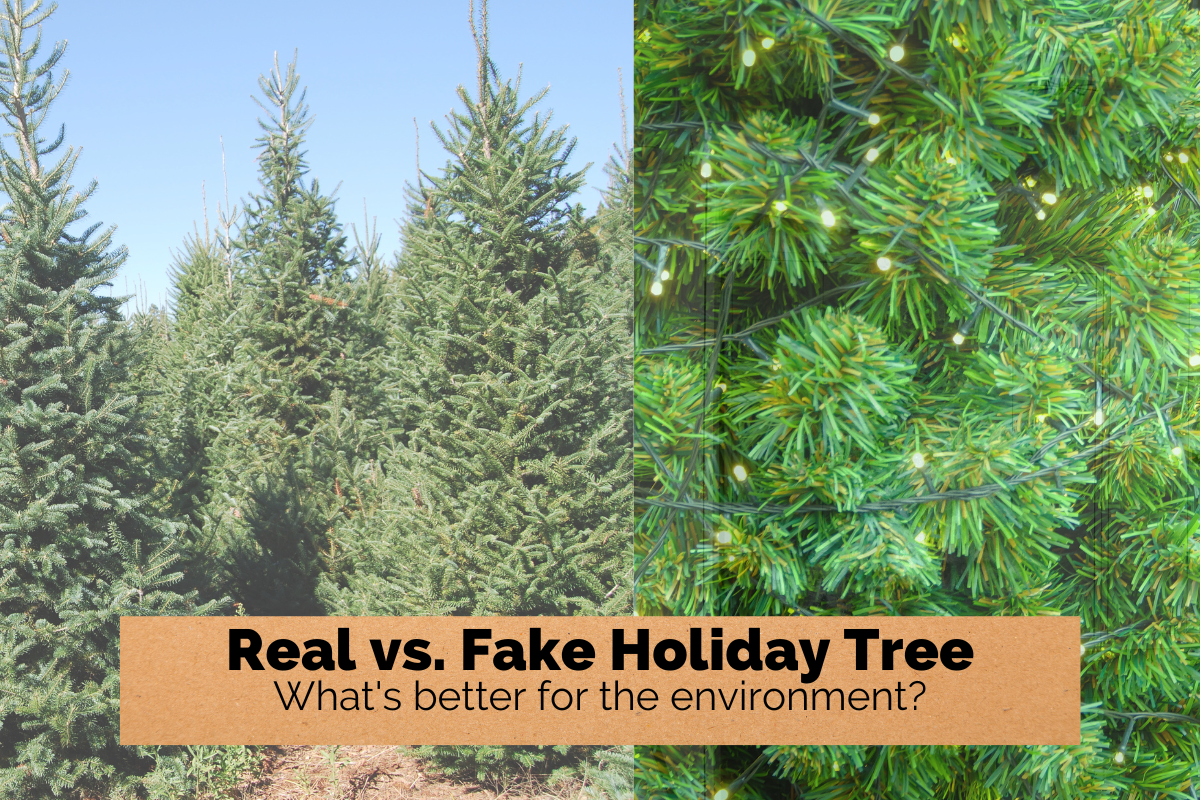Is a Real or Fake Christmas Tree More Eco-friendly?
Need help deciding between a real tree or faux fir? Let us help in the greenest way.
Holidays Have a Waste Problem
Americans produce nearly 5 pounds of trash per day, according to the EPA. Even more Brightly Co., says that figure rises to 6.25 per person during the holidays, totaling 2,887,500,00 pounds every year.
Beyond deciding to use reusable dish-ware at holiday parties or gifting experiences over material things … another conundrum we must decide upon is whether it’s more sustainable to purchase a one-time use real tree, or a reusable plastic tree.
Bringing home a freshly scented living tree can be romantic and nostalgic. But the idea of killing a tree and transporting it to your house may seem counter to your eco-friendly goals. Olaf summarized his understanding of this holiday tradition best … “You cut down a tree... and then you dress its corpse... with candles.”
Okay, got it. 😂
Dusting off a plastic tree from the attic may seem like the obvious choice. You can use that tree for multiple years (6-20 depending on quality), they are made with fire-resistant materials, and you’ll save money over time by reusing.
And isn’t reusing one of the big tenants of zero-waste lifestyles?
Yes it is, but there’s more to consider …
Why Plastic Trees Ain’t it
According to USA Today, nearly 10 million plastic trees are bought and shipped overseas, increasing carbon emissions and resource use. In addition, fake trees aren't recyclable nor biodegradable, so even if your artificial tree lasts ten years (which it likely will not), it'll end up in a landfill somewhere.
It Gets Darker …
PVC is the plastic often used to make fake trees. Producers stabilize the PVC with lead. Which means when the tree inevitably flakes off dust on the ground and in the air, you’re family is taking in toxic chemicals called endocrine disruptors. Nasty business.
Wait, shouldn't we avoid cutting down trees?
Out of 350-500 million natural (trees) being grown, only about 30 million are harvested for the holiday season. While there are logging issues, it’s best to consider real trees as crop rather than towering pines we mustn’t touch.
Many small businesses grow them specifically each year for the holidays. Commercial tree farms are well-informed on sustainable methods for cultivating and recycling their products. By purchasing a real tree, you are supporting tree farmers who can keep their land covered by a healthy forest (which wildlife depends on to survive).
Tree farms are great for the environment and create jobs for humans, homes for animals, oxygen for all, and bundle up a bunch of holiday cheer.
“Our power to make a difference is as easy as 1-2-tree. This year, you can do your part for nature by picking out a real tree that's beautiful and good for nature. That could cement your position on the ‘nice list.’” — The Nature Conservancy
Tree Farms Are Good for the Earth
Scientists say the best way to protect a forest is to utilize them - carefully. When sustainably managed, forests can produce renewable resources, like wood-made products and holiday trees.
Well-maintained forests can store as much carbon as unmanaged forests, making innovative forest management methods a pivotal solution to fight climate change.
Nearly 50% of all forests are privately owned. Support local communities by checking the tag for sustainable forest products to keep their land forested.
Research by The Nature Conservancy suggests we can slash more than 30% of the carbon emissions needed to slow climate change with natural solutions, like restoring forests. In addition, supporting local tree farmers by purchasing actual holidays helps manage healthy forests.
All that to say: Consumers can feel good about purchasing a real tree because it's better for the environment and local business community.
Where to Recycle Your Real Tree
Our side of Nebraska has plenty of options for getting your tree turned into mulch. Here’s what we recommend …
Have the scouts pick it up: Support Scouting 4 Trees
Various Omaha-area drop-off sites: Santa's Woods
Give it to us & get year-round compost drop-off access & product discounts: Compost Club
Every tree we receive through Compost Club will be sent to our Soil Dynamics Compost Farm, the Omaha area's only industrial composting facility. Trees parts will be transformed into mulch or mixed with the composting process.
When mulch from your trees is mixed into our composting process, it gives microbial life an epic feast resulting in nutrient-dense soil that will eventually make its way back into community yards and gardens.
By composting your trees, you're supporting our local composting programs, helping Omaha grow healthier plants, and supporting local sustainability.
Here are a few things to remember in prepping your tree:
No metal or plastic trash bags
Remove all ornaments, glitter, or tensile
Host Your Own Tree Drop-off Site
If you’re a business, school, or church, you can partner with us to show your community your eco-support (and we made a guide to help you do so here).
You’ll need room for a 20 to 40-yard roll-off container. Large, open parking lots work best. Review our container sizes here.
If interested, hit the green button below and we’ll fill you in on the details and cost.





